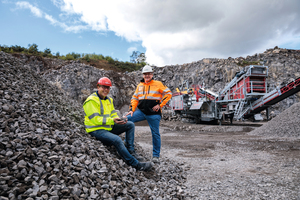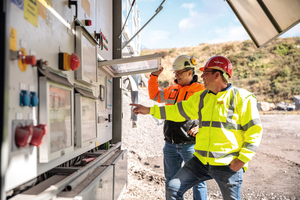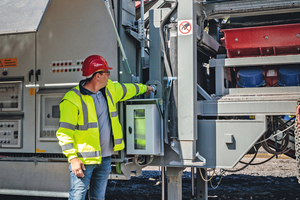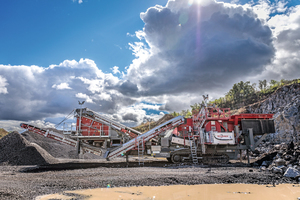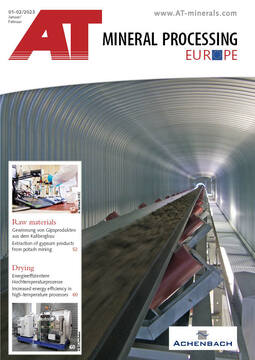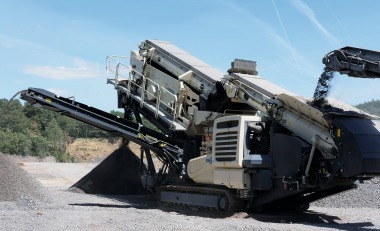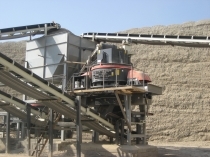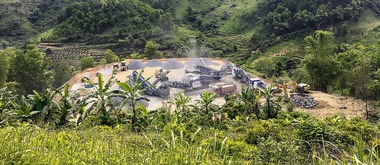Mobile integration in the traditional Eifel company
As early as 1908, the extraction and processing of tephritic basalt lava was carried out in Mayen by the MAYKO company. Ernst Scherer Baustoffe GmbH & Co. KG, which was founded in 1937, also draws on a wealth of experience in the quarrying and processing of natural stones of volcanic origin. In June 2020, it took over the tradition-rich site in Mayen, which means it now operates a total of seven active plants in the Volcanic Eifel.
Natural stone through the ages
“Quarrying in Mayen used to focus more on ashlar; today, the production of bulk products is just as important,” explains Thorsten Malich, responsible at Scherer for the technical use of mobile rock processing at the site. “That’s why, in the past, the natural stone was often mainly “pulled” with excavators or blasted in such a targeted way that the stones of the basalt columns were preserved in their entirety.”
Previously, production in Mayen had been carried out exclusively with an ageing stationary plant consisting of a jaw crusher, two separate cone crushers and various conveyor belts. Against the background of the existing mining potential, the operators were faced with the decision to implement a more flexible handling of the entire processing technology along the demolition edge. Both the classification and the entire process of pre-crushing as well as post-crushing were to be mobilised.
“We decided on a double crushing plant as a mobile complete unit, as we needed an uncomplicated, robust and future-proof solution for the natural stone processing in Mayen. Should the mining reserves here in the quarry be exhausted at some point, we can transport the entire plant to another location with three low-loaders within just two days.” It is a mobile solution from the Swedish manufacturer Jonsson: the concept of the L 120-330 track-mounted duo crushing plant combines the two Nordberg C120 and GP330 crushers with a three-deck screening plant and a vibro feeder with step screen for pre-screening (crusher components from Metso Outotec) on an overall chassis. The combined plant is powered by a 6-cylinder Volvo diesel engine with a 2900 l fuel tank that drives the generator. The latter supplies power to the two electrically driven crushers and all other aggregates. “We had already had positive experience with a Jonsson plant elsewhere in the past, which left us in no doubt about the reliability and functionality with this new design,” says Malich.
First use in Germany
What functions does the plant cover with its coordinated components? After the material is fed in, the vibrating screen with replaceable screen linings already extracts fine rock components from the circuit – a prerequisite for a stable and uninterrupted processing process. After the coarse material has been crushed in the jaw crusher, it passes through the three-deck screen, from where the oversize material is fed into the cone crusher via the closed circuit. The final product 0/32 or 0/45 mm from the triple-deck screen, which is also located on the common frame, is then discharged to stockpile.
“For us, the use of the double crusher plant for the production of basalt crushed stone was conceivably simple right from the start – material comes in at the front, 0/32 comes out at the back,” Thorsten Malich sums up. “In this way, we produce between 2000 and 2500 t of material ready for sale every day. Optionally, in addition to this fraction, we can also discharge gabion stones as an intermediate product and return the oversize material to the cone crusher. If it is necessary to change over to another process – for example to a 60/120 fraction that is used as a base course in road construction – the changeover time is only 20 minutes; we particularly appreciate this degree of flexibility. By using the combined crushing and screening plant, we also save a lot of time and space, because unlike before, we do not have to operate with additional wheel loaders or conveyor belts from the material feed to the end product. All in all, it can be said that the plant correlates seamlessly with the needs of a quarry operation, especially in terms of accessibility and ease of maintenance. Depending on the mining progress, the plant can be moved around the site without any problems.”

